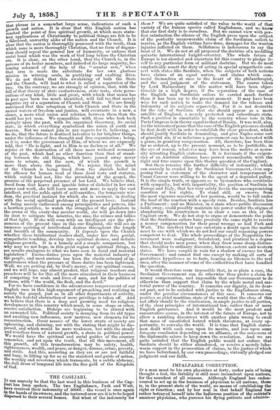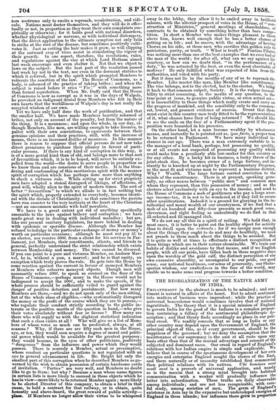IMPALPABLE CORRUPTION.
IF a man must be his own physician at forty, under pain of being thought a fool, the liability is still more incumbent upon nations, for the soundest of all reasons. Although England has endea- voured to set up in the business of physician to all nations, there is, in the present state of the world, no means of establishing the right or function ; and by her zeal in that behalf England has rather betrayed herself into the ludicrous position of the satirists amateur physician, who pursues his flying patients and admtms- ters nostrums only to excite a reproach, recalcitration, and ridi- cule. Nations must doctor themselves, and they will do it effec- tually or not in proportion as they treat their own complaints em- pirically or otherwise ; for it holds good with national disorders, whether physiological or nervous, as with individual distempers, that the direct application to the ultimate symptom not only fails to strike at the root of the disease, but sometimes positivelyculta- vates it. Just as cutting the hair makes it grow, so will clipping at the outward crop of vices assist in stimulating the vigour of their growth. In one aspect, therefore, the resolutions, rules, and regulations against the vice at which Lord Hotham aimed last week encourage and even shelter it. Not that we object to laws on the subject. But the best part of the resolution passed last week lay not in the text, nor even in the dormant statutes to which it referred, but in the spirit which prompted Members to reiterate the assertion of the law. The House of Commons, as a body, is ashamed of the practice of taking bribes ; and when the subject is raised before it cries " Fie !" with something more than formal reprobation.. When Mr. Duffy said that the House of Commons is now as corrupt as it was in the days of Walpole, he provoked an indignant denial from Members who felt in their own hearts that the worldliness of Walpole's day is not really the accepted wisdom of our own.
Yet we have only half done the work of purification, and that the smaller half. We have made Members heartily ashamed of bribes, not only on account of the penalty, but from the nature of the thing. It is a meanness ; and upon the whole, in our day, al- though Members, like men, are willing enough to take licences, to palter with their own convictions, to equivocate between their genuine opinions and their practices, still, with the increase of means, there is an increased dislike of meanness. In like manner there is reason to suppose that official persons do not now take direct premiums to purchase their pliancy in favour of parti- cular persons. If there is any kind of corruption in this way, it is of a more genial kind than of old, and belongs more to that sort of favouritism which, it is to be hoped, will never be entirely ex- pelled from the world—the desire to serve people in proportion as we know them and are conscious of their merits. It is the blun- dering and confounding of this meritorious spirit with the meaner spirit of corruption which has perhaps done more than anything to check a virtuous rule. While setting up for strict propriety men have adopted a stoical disregard of likings, of affections, of good will, wholly alien to the spirit of modern times. The sort of better " favouritism" to which we allude is in fact nothing but the spirit which, properly extended to everybody, becomes identi- cal with the dictate of Christianity ; so that sometimes the purists have run counter to the very instincts at the heart of the Christian —not an uncommon mistake with half moralists.
We have to a great extent got rid of anything specifically amenable to the laws against bribery and corruption ; we have made great way in dealing with individual maladies ; but are, like our present sanitary legislators, far more behind in dealing with epidemic or sporadic disease. Although the Member has refused to indulge in the particular exchange of money or money's worth on particular occasions ; although he must not pay 51. to an elector, nor receive 5001. from a client for his services in Par- liament, yet Members, their constituents, clients, and friends in general, perfectly understand the strict relationship which exists between Membership and money. The two cannot be divorced. If you can point to a pure and virtuous Member, an Andrew Mar- vel, he is, without a pun, a marvel ; and he is that rarity, an exception which truly proves the rule. He gets into the House by seine reaction against the current in favour of moneyed Members or Members who subserve moneyed objects. Though men will necessarily refuse 5001. to speak as counsel on the floor of the House of Commons,—perhaps many in the House would not be indisposed to accept the 5001., and to make the speech, if the whole process should be sufficiently veiled to guard against the danger of positive detection and punishment. But how many Members are there,—and we do not speak only of the men sitting, but of the whole class of eligibles,—who systematically disregard the money or the profit of the course which they are to pursue,— who regulate their conduct strictly according to the public in- terests or the positive merits of the question in hand,—who give their votes absolutely without fear or favour ? How many are there who will supply us with the slightest statistical indication that such a class exists at all ? Who will give us a list of Mem- bers of whose votes so much can be predicated, always, at all seasons ? Why, if there are are fifty such men in the House, aye, or ten, they would soon acquire a degree of moral and politi- cal power which would be available for the greatest purposes ; they would become, in the eyes of other politicians, positively " dangerous" from the influence and power which they would possess. There is scarcely a Member, actual or presumptive, whose conduct on particular questions is not regulated with an eye to general advancement in life. Mr. Bright hit only the smallest part of this corruption when he described Members as go- vern. ed. by the wish to obtain possession of certain handsome cards of invitation. "Parties" are very well, and Members no doubt like to po to them; but why ? Because a man whose name figures III certain lists is more likely to succeed in those objects which he
has in view—more likely to be returned Member again ; more likely to be elected Director of this company, to obtain a brief in that cause, to hold a contract for that railway, or to obtain, quite
honestly and above-board, the great reward of public activity— place. If Members no longer allow their virtue to be whispered away in the lobby, they allow it to be smiled away in brilliant saloons, with the ulterior prospect of votes in the House, of " con- struction of Ministries," general meetings of shareholders' or contracts to be obtained by something better than bare compe_ tition. In short a Member who makes things pleasant to those above him, knows well enough that he has a better chance of getting on in life ; and he sneers, with the advantage of having Chorus on his side, at those men who sacrifice this golden rule to patriotism, purity, or truth. " What is truth ?" Pontius Pilatus was nothing more than one of the best examples that we ever had of the man of the world ; for after all, what can we say against his courtesy, or how can we doubt that, "in the performance of a duty," he was actuated by the best, or even the most charitable of motives ? He only fulfilled what was expected of him from the authorities, and voted with his party.
But it does not lie in the months of any of us to reproach the Member. Like master like man, like Member like constituency. The vice belongs, not to the elected, but to the elector. We bring it back to that common culprit, Society. It is the vulgar insensi- bility to strict reasoning, to the merits of any question, to the true point at issue, to genuine public virtue, or even actual art— it is insensibility to those things which really create and carry on the progress of mankind, and the sensibility only to the common- est, lowest, and grossest evidence of success. Grant that there must exist in this country men truly fitted to be the representatives of it, what chance have they of being returned ? We should like to see the smile on the face of a Parliamentary agent if the pro- position were hazarded in his presence.
On the other hand, let a man become wealthy by whatsoever means, and instantly he is pointed out as, ipso facto, a proper man to be returned to Parliament. We have many individual in- stances in our age. There was a man extremely suitable to be the manager of a local bank, perhaps, but possessing no quality, or at all events not suspected of possessing any quality which could make him a peculiarly able law-maker for this country or for any other. By a lucky hit in business, a lucky throw of the joint-stock dice, he becomes owner of a large fortune, and in- stantly he is knocked up at night by the Parliamentary Diogenes, as the most fit and virtuous man to represent a business district. Why ? Wealth. The large fortune carried conviction to the minds of the constituency. There is at present, speaking gene- rally, no other nexus between "public men" and common men whom they represent, than this possession of money ; and as the electors select exclusively with an eye to the income, and send to the House of Commons a mob of gentlemen who pay a large aver- age income-tax, it is not to be wondered at if they fail to secure other qualifications. Indeed it is a ground for glorying in the in- tellectual and moral wealth of our countrymen, if we find that a mob of six hundred and fifty-four presents so much good sense, cleverness, and right feeling as undoubtedly we do find in that ill-selected and ill-managed club. We do not say all this in a spirit of railing. We hold that, in most cases, it is better to point out the healthy object for activity than to dwell upon the eritanda ; for if we occupy men enough about the things they ought to do and may do healthily, we need not preach to them much about the things to be avoided. But it is quite as well at times to effectuate a distinct recognition of those things which are in their nature abominable. We train our habits of dislike and avoidance by that means, and if we English people, with all our pride, have fallen back in these negative days upon the worship of the gold calf, the distinct perception of our own excessive absurdity, so uncongenial to our pride, our good sense, our national heartiness, our sense of generosity, our Shake- sperian wisdom, our exaltedness in the face of the world, may enable us to make some real progress towards a better condition.



































 Previous page
Previous page